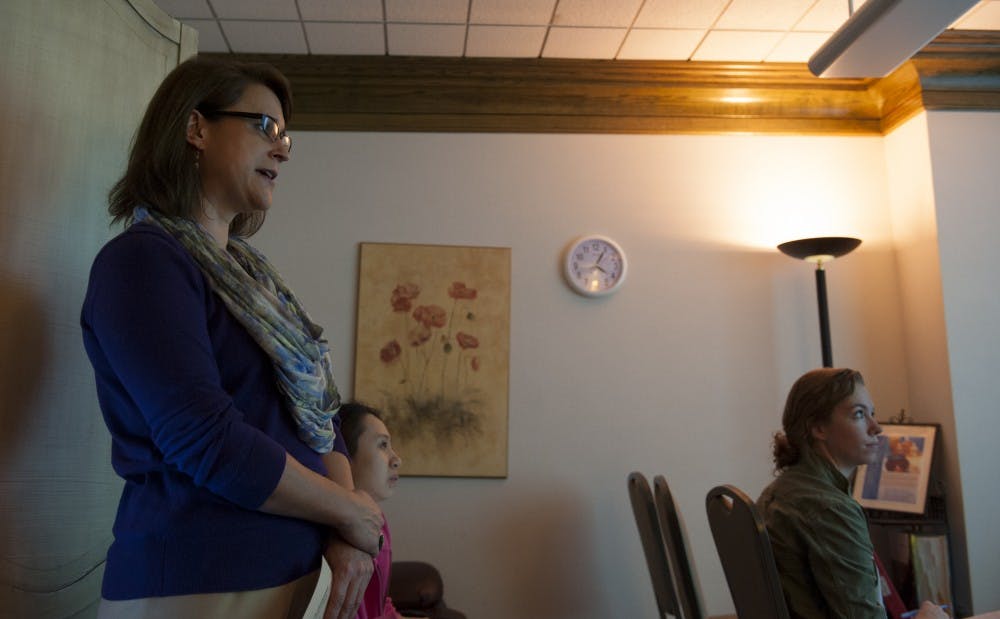Batka said using the Wellness Room in M005 of the Indiana Memorial Union was CAPS’ way of responding to students’ common issues in a central location. She said CAPS’ Monday Motivators program deals with common student issues in a group environment.
“They’re just common issues that we hear this time of year or chronic issues like sleep,” Batka said. “A number of them are pretty basic body needs. If your body’s not functioning, everything is going to be out of whack.”
Yesterday’s workshop, “Conquer Procrastination,” was an overview of the causes of procrastination and skills to combat any type. Batka constantly returned to the idea of considering the first step in any task being put off by a student.
“There’s a lot of different types of procrastination,” Batka said. “A lot of times people will procrastinate because it’s painful and people don’t know how to deal with it.”
The three types Batka addressed in her workshop were life routine procrastination, decisional procrastination and academic procrastination. Although they deal with different facets of life, Batka said they all fall under the same umbrella of avoidance.
“If you lump them all together, the basic idea is that you’re trying to avoid something that’s uncomfortable,” she said. “What tends to happen, though, is that it makes it worse.”
Batka asked students to compare how time was spent with what time of day they considered themselves to be most productive. In becoming aware of the time in which they hit their peak in activity, Batka said, they have the opportunity to schedule certain tasks around that time.
It’s important for students to distinguish between urgent tasks and important tasks when planning which ones to prioritize, she said. She defined urgent tasks as ones that had an approaching deadline, while important tasks are those the student most cares about.
She said tasks could be split into the four overlapping categories of urgent/important, urgent/not important, not urgent/important and not urgent/not important, and prioritized from there. She said tasks that were important should be at the top of the list.
“The ones lowest on this list — they’re going to feel pressing, they’re going to feel important,” she said. “But it’s more urgency than importance. So you’re going to want to minimize those, and you’re going to want to prioritize, which can be hard, the not urgent/?important.”
In order to do this, Batka said students should set both product goals and time goals. She defined product goals as determining how much progress should be made on a task, while time goals were limiting the amount of time spent on a task.
Although these tips pertained to academic procrastination, Batka said students must consider procrastination in their lives outside ?of school.
“A lot of people say ‘I’m a procrastinator,’ meaning ‘I am, I equal procrastination,’” Batka said. “So the idea of procrastination as who they are versus the idea of it as a skill that can be worked on.”
The practice of willpower is helpful in motivating students in their own lives to battle what they are putting off, she said. Active participation, she said, is part of this.
Active participation promotes a positive attitude toward the activity, rather than the negative attitudes that procrastination can reinforce. When approaching a large and seemingly insurmountable task, Batka said, it’s crucial that a student breaks it down into the first step.
“That initial engagement is really, really key,” she said. “If the thought comes into your mind, ‘I should do this,’ do it.”
Batka said even committing five minutes to a task can diminish the doubts a student might have about completing it, or the inner ?“I can’t.”
Instead of automatically thinking about the “I can’t,” Batka said, students should isolate those thoughts and think about what they can do to start. She said addressing this fear of failure often leads to finding the first step in a task.
Batka said to consider what thoughts are causing the fear behind procrastination and disengage from them.
“A thought is just a thought,” she said.
Senior Yishan Liu said after the workshop she might be able to better isolate what is causing her procrastination. She said she had not considered what procrastination actually was or what caused it but thought it was something she could not control.
Liu said she will now question what is holding her back from completing the task at hand.
“It just makes my enemy more visible,” she said.






